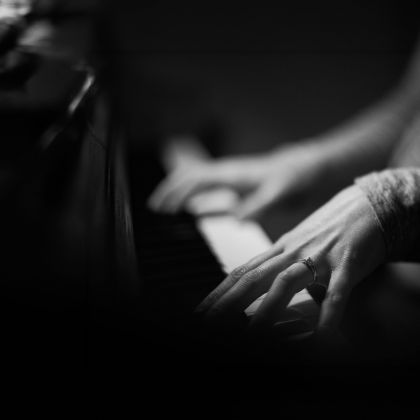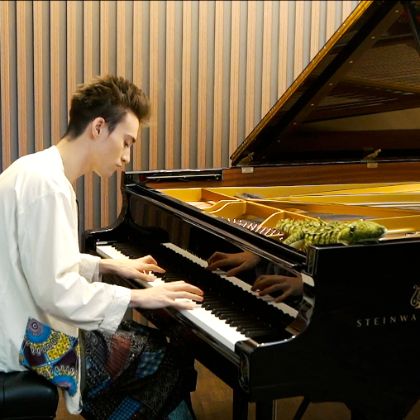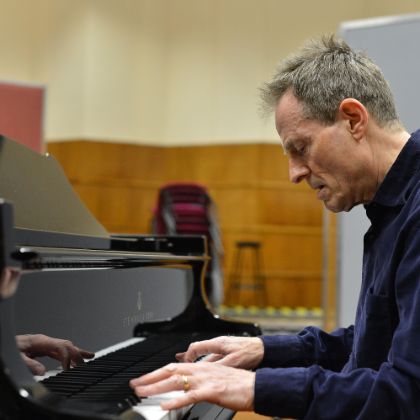Listen Magazine Feature
Pianist ChangYong Shin on grappling with the Classical repertoire
By Ben Finane
Twenty-two-year-old pianist ChangYong Shin took First Prize in the 2016 Hilton Head International Piano Competition and really made his debut release for the Steinway & Sons label with a recital program: Bach | Mozart | Haydn | Beethoven. He spoke Ben Finane, Editor in Chief of Steinway & Sons and of listenmusicculture.com, on the expressive challenges of the Classical repertoire.
Talk to me about the Classical program you have put together here for your Steinway & Sons label debut.
Classical pieces and also Baroque pieces (the Bach Toccata in D Major, BWV 912) can also showcase your inner expression. I thought it would be challenging to include music from the Classical and Baroque periods. Maybe they would sound as “attractive” as other, more virtuosic pieces, but that’s who I am, in these pieces, and that’s why I wanted to record them.
When you say it’s who you are, what is it about these pieces that draws you in?
When you play virtuosic pieces, you can’t fully focus your character. There are technical issues with your fingers. With a classical-period piece, it’s not as difficult technically, but it difficult musically, and you really have to show your ability with your thoughts.
‘When you play virtuosic pieces, you can’t fully focus your character.’
What are the musical challenges of the Classical period for you?
It sounds simple at first. There are fewer notes in the music. But with fewer notes, you still have to express everything — your every thought, your feelings. What was happening during the period that this was composed? You can easily guess with a Prokofiev Sonata or a Chopin Polonaise, there is a specific character there. Percussion with Prokofiev’s “War Sonatas,” the dance rhythms of Chopin’s mazurkas and Polonaises.
But with this late Sonata of Beethoven that I recorded (No. 28 in A Major, Op. 101), it falls between Classical and Romantic. It’s late-period Beethoven, and there are a lot of lyrical moments. In his late period, there is a lot of monophonic beauty and lyrical polyphony. There is a lot of energy, but also an inner vibrancy. It is much harder to express all of this.
And how about this Bach Toccata (BWV 912)?
There are seven Bach Toccatas, and this is one of his most “open” Toccatas. What I like about it: a lot of short trills, and then a Fantasy opening; it has a gradual, friendly sound that is approachable for the listener. And the meaning of the opening can be easily delivered to the listener. While the Toccatas were originally written for organ, this one really suits the piano and is similar to the early Sonata form.
It’s always interesting to remember that they never gave Bach the keys to the piano.
[Sorrowfully:] I know….
So you get to make decisions that couldn’t be made when the music was written. What is your goal when bringing a work written for organ to the piano?
Bach has a lot of counterpoint and so lot of voices are going on. For some parts, I imagined the organ sound. These different voices are all different characters, and I’m trying to make each line a different person.
What is your next musical exploration?
I’ve been working on Russian composers — Rachmaninoff and Prokofiev. And I’d like to also approach more contemporary music. I attend the Juilliard School and a lot of contemporary concerts are always going on and I’m really interested. I haven’t learned the Ligeti Etudes yet. I’m trying to approach that period more, and to connect with the music and the composers’ intentions. That’s what I’m exploring now.
This article originally appeared in Listen: Life with Music & Culture, Steinway & Sons’ award-winning magazine.
About the Artist
ChangYong Shin of the Republic of Korea is the 2016 First Prize Winner of the Hilton Head International Piano Competition. He was also the First Prize winner of the Kookmin Ilbo & Hansei University Music Competition (2005); Grand Prizes at the C. Bechstein & Samik Music Competition (2006), the Hankook Ilbo Competition (2006), and the CBS Competition (2008); First Prize at the Ewha & Kyeonghyang Competition (2008), and Third Prize at the Chopin Junior Competition and the Eumyeon Competition in 2005. In 2010, Mr. Shin won Third Prize and two special prizes (Romantic period and Master Class) at the Eastman Young Artists International Piano Competition in America.
related...
-

Practice, Practice, Practice
Steinway Artists on the Rewards of Routine
by Laura Lee Smith
Read More -

Steinway Artist - Jacob Collier: Little Blue
Read More -

Steinway Artist - John Paul Jones
John Paul Jones (born John Baldwin on January 3, 1946) became a prolific music director and arranger of a range of prominent Sixties artists before forming Led Zeppelin with Jimmy Page in 1968. Since 1980, the multi-instrumentalist embarked on a solo career, and his collaborators have included the supergroup Them Crooked Vultures as well as Paul McCartney, Brian Eno, and Diamanda Galas.
Read More